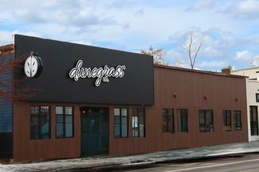
Film Review: Conclave
4 Stars
By Joseph Beyer | Nov. 16, 2024
While there aren’t many Lutheran or Presbyterian thrillers out there in the multiplexes, audiences can always count on the world of Catholicism to return to the big screen. Vatican City alone is so cinematic and intriguing there are over 40 films set there, according to Wikipedia. So while an adult drama that plays out against discussions of theology and bureaucracy may not seem intriguing, the new film Conclave will surprise you—if you are among those many people fascinated by patriarchal papal politics.
That’s because Conclave is a thinking person’s picture, with lots of hushed dialogue and intense energy expressed only through facial expressions and innuendo that you will be forced to interpret. And the realistic tension at the heart of this dramatic film—who will become the next pope after the mysterious death of a predecessor—holds its own until the end, leaving you to almost believe it could have unfolded this way.
The conclave is an ancient ritual dating back to 1276. It dictates any new pope must be elected by a gathering of the College of the Cardinals in Rome, and that each cardinal must arrive to vote in person under extreme secrecy. Over a hundred cardinals from around the world debate behind closed doors the Sistine Chapel under the watchful eye of Michelangelo’s famous paintings.
Believers gather outside. If no pope is elected by a majority, the ballots are burned and the smoke from the chimney is black. If a new pope is chosen, the ballots are burned and the smoke is white: announcing a new reign and leader of the church.
It is a tradition already ripe with drama, so when the film introduces an inner power struggle to the narrative, along with suspicions and shifting loyalties from all sides, the result is a chess game of potential outcomes.
Directed by Edward Berger (All Quiet on the Western Front) from a screenplay by Peter Straughan, Conclave is based on the novel of the same name from author Robert Harris.
Conclave’s European pedigree is clear, as Berger unfolds the story piece by piece and character by character, weaving the mystery together and keeping the tension building until the film’s very unusual end.
At the center of this struggle is Cardinal Lawrence, played with restraint and conviction by the especially talented British actor Ralph Fiennes. In his hands, Cardinal Lawrence becomes the keeper of the conscience of the church while trying to lead the conclave to its conclusion. The only thing standing in his way is a volatile fight for the papacy and lingering questions about the previous pope’s death.
The rivalry between potential popes is heated and full of dogmatic divisions, and it pits multiple cardinals against each other in a fight for control of the church. In one ideological corner is the modern liberal Cardinal Bellini, played by Stanley Tucci, who reminds us with his performance why audiences should see him in more films.
Aligned against him are Cardinals Tremblay and Tedesco, played by actors John Lithgow and Sergio Castellitto, respectively. They are hardliners filled with ambition, and each proactively seeks the spiritual throne. Once voting begins, a previously unknown Cardinal Benitez (played with a quiet edge by Mexican actor Carlos Diehz) emerges as a contender who could ruin all the best laid plans…and the stage is fully set.
For most of Conclave you will likely feel intrigued and sometimes riveted. As the story is untangled in the final act, you may wish for less religious repartee and possibly some more plot. But in the end, the film delivers on fascinating themes you won’t see many other movies taking on, and for that and more, it’s a worthy experientia.
Rated PG, primarily for the chain smoking displayed by some cardinals, and running 120 minutes, Conclave is currently in theaters and expected soon to stream on Peacock and Apple.
Trending

Michigan’s Marijuana Tax at Work
Cannabis has become a big business in northern Michigan, and local governments are putting tax dollars earned from dispensar… Read More >>
California Sober: Why People Are Switching from Alcohol to Weed
They call it “California sober.” Generally speaking, this term applies to folks who use marijuana but abstain f… Read More >>
The Legacy of Student Activism
“It’s a physical letter to your representative,” Alex Tank says when asked to define the word “prote… Read More >>


